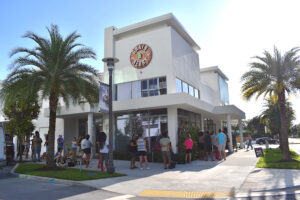Elon Musk’s Neuralink company makes devices that link the human brain to computers, focusing on giving people with quadriplegia or paralysis the ability to control computers and devices with their thoughts. The Miami Project to Cure Paralysis and the Department of Neurological Surgery at the University of Miami will be the second U.S. site to participate in research. (Kirsty Wigglesworth/AP file)
By Cindy Krischer Goodman | [email protected] | South Florida Sun Sentinel
Computer interface targets paralysis and motor skill impairments
Elon Musk’s Neuralink has selected Miami as a clinical trial site for its brain-computer interface.
Musk’s Neuralink makes devices that link the human brain to computers, focusing on giving people with quadriplegia or paralysis the ability to control computers and devices with their thoughts. The Miami Project to Cure Paralysis and the Department of Neurological Surgery at the University of Miami will be the second U.S. site to participate in research known as the PRIME Study.
Neuralink is already conducting clinical trials at Barrow Neurological Institute in Phoenix, Ariz. The company announced its first brain implant one year ago and announced earlier this month that a third person had received an implant. Patients who received the implants have been playing video games and online chess by simply thinking about steering left or right.
For the PRIME Study, Neuralink scientists and a multidisciplinary team of neurosurgeons, neuroscientists and biomedical engineers at The Miami Project and the Miller School of Medicine will implant the device in local participants.
“This collaboration represents another great opportunity to combine our clinical research expertise with the forward-thinking team at Neuralink,” said Marc Buoniconti, president of The Miami Project. “We hope this partnership is another significant step in finding meaningful solutions for the millions living with paralysis and other significant motor deficits.”
The Miami Project to Cure Paralysis at the University of Miami focuses on developing new strategies for repairing the nervous system and improving quality of life following spinal cord or brain injury.
On its website, Neuralink says, “We want to continuously improve our technologies based on learnings from clinical trials as we look to maximize the number of people we can potentially help.”
For the PRIME Study, Neuralink is looking for patients who have limited or no ability to use both hands as a result of a cervical spinal cord injury or ALS. Additional details about the PRIME Study can be found on ClinicalTrials.gov. Individuals interested in learning whether they qualify for this trial can join Neuralink’s United States Patient Registry.





















